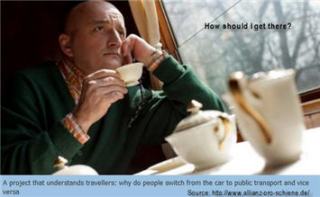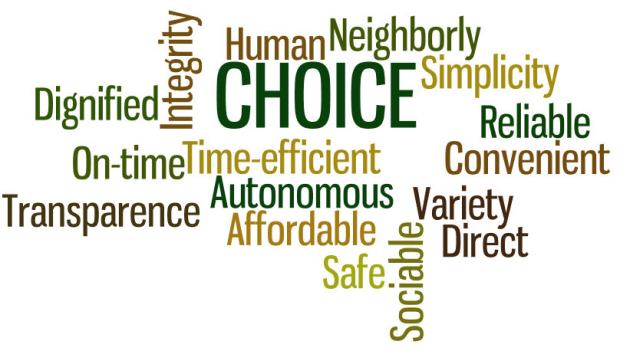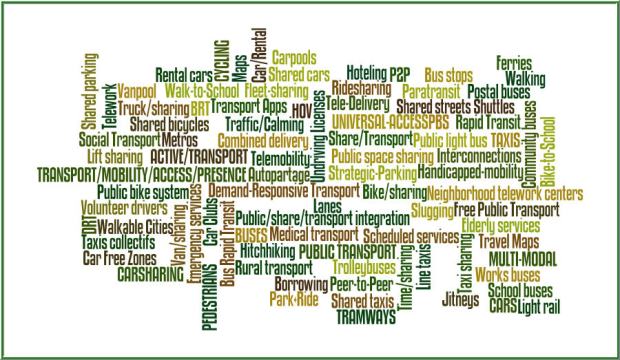 Nobody is going to willingly step down on the scale of comfort and economy. Fair enough, so let’s see how we can all step UP in terms of life quality for all with an equity-based transport strategy.
Nobody is going to willingly step down on the scale of comfort and economy. Fair enough, so let’s see how we can all step UP in terms of life quality for all with an equity-based transport strategy.
The objective here is to combine vision, policy, technology and entrepreneurial skills in such a way to create and make available to all a combined, affordable, multi-level, convenient, high choice mobility system which for just about everybody should be more efficient than owning and driving a car in or into town. Let us start with this as our goal and then see what is the work that must be done in order to turn it into a reality.
This is a strategy, well known in many leading cities by now, which has two principal legs: The first is to create a structure of pricing, available street and parking space, and conditions of transit which together impose on car owner-drivers the full cost of their use of scarce and valuable public space in the city. Thus, because cars are notoriously space-inefficient, which becomes especially problematic when their numbers pass a certain threshold, the time comes when they have to pay their way. Now this is not a matter of being anti-car, but rather one is being pro-cities and pro-people. And for strategic reasons it is critically important to emphasize this positive aspect.
The other leg of the new policy paradigm includes of course more traditional forms of state-of-the-art public transport — but also greatly enhances the level of service offered by creating a bouquet of multiple, alternative mobility choices bringing together a multiplicity of new systems, each of which does a part of the job and which gained their full strength when combined with the other necessary supporting ingredients. (We often refer to these as 1% solutions, giving indication of the number and variety of mobility options which need to be combined to make the overall approach work.)
As we start to fashion these various support system we do well to remember that the main reasons that people choose one form of transport over another is the relative advantages offered in terms of convenience, cost and conviviality. Safety and reliability are also right there at the top of the list.
Here is our rough mindmap in which we illustrate the various main values that users have in mind for equitable transport.
Equitable Transport: User Perspectives and Desires
We often speak of a “bouquet” of mobility services, by which is meant that the “better than car” transport system is not a single mover, not even a multibillion-dollar Metro, but rather a strategic combination of multiple and varied mobility options which link and overlap to provide high-quality and affordable transportation service for all.
Traditional public transit is a critical part of this integrated mobility package, as are bicycles, public and private, and agreeable and efficient walking. But so too are the growing array of alternatives which include, among others, carsharing, ridesharing, taxi sharing, small bus services, demand responsive transit, affordable taxi-based transport for the elderly, handicapped and other fragile groups, and the long list gets longer every day.
What does a Better than Car Mobility System have to offer
It will come as no surprise in Finland that one of the key ways of tying all of these services together is through the abundance of information technology resources which are available to most, but not all, Finnish citizens, including Internet in all its variations but above all the communication system which the vast majority of people living in Helsinki have in their pocket, their mobile phone.
The second step to bridge all of this multitude of services is through a unified fare/payment policy which combines to make all of these individual modes part of what is seen and used as a single unified seamless system. Or in other words, our “better than car” 21st century mobility alternative.
Per Schillander comments on this from Sweden on 20 March:
Dear Eric,
1. Sometimes I can’t resist to answer your stimulating mail and postings This time I have some minor reflections:
a. Your leading phrase maybe lead the reader wrong. It’s a pity if people regard changes as a “step down on the scale of comfort and economy”. I prefer to see it as a trade or swap of values – you pay more and you win convenience. You lose comfort but you win time.
b. Yes, all travelers choose the most rational way of travel and they make their own balance of the ingoing parts (cost, time, reliability etc.) (At the same time we know that many travelers don’t have all information about the size of these parts …) Maybe your picture/mindmap should better point out this ‘subjective rationality’?
c. I agree that “abundance of information technology resources” and “unified fare/payment policy” must be and will be core elements of our “better-than-car system”. At the same time I’m afraid that this ‘utopious-technical-solution’ will slow down the growth of the better modes. We have to make them grow with ‘fair enough-solutions’ while we develop better solutions. If we think they can’t or won’t grow without this ‘final solution’, were having problems. The strong wish for simplicity should also be taken into account – maybe (some) people like old fashioned things like cash money, paper tickets etc.? And the wish for integrity, of course.
(Editor: I will definitely make sure that we do not tip into this ‘utopious-technical-solution’ as work on the book proceeds.)
At this point all of the basic, the various mobility modes and the ways of connecting the are well known at the leading edge. The real trick will be to create a unified policy framework to combine all the multiple components and choices needed to create our 21st century better-than-car system, with the concept of equity at its base. That will keep us all plenty busy.
# # #
About the author:
Eric Britton
13, rue Pasteur. Courbevoie 92400 France
Bio: Founding editor of World Streets (1988), Eric Britton is an American political scientist, teacher, occasional consultant, and sustainability activist who has observed, learned, taught and worked on missions and advisory assignments on all continents. In the autumn of 2019, he committed his remaining life work to the challenges of aggressively countering climate change and specifically greenhouse gas emissions emanating from the mobility sector. He is not worried about running out of work. Further background and updates: @ericbritton | http://bit.ly/2Ti8LsX | #fekbritton | https://twitter.com/ericbritton | and | https://www.linkedin.com/in/ericbritton/ Contact: climate@newmobility.org) | +336 508 80787 (Also WhatApp) | Skype: newmobility.)


